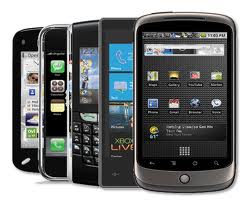Computers range in size and capability. At one end of the scale are supercomputers, very large computers with thousands of linked microprocessors that perform extremely complex calculations. At the other end are tiny computers embedded in cars, TVs, stereo systems, calculators, and appliances. These computers are built to perform a limited number of tasks.
The personal computer, or PC, is designed to be used by one person at a time. This
section describes the various kinds of personal computers: desktops, laptops,
handheld computers, and Tablet PCs.
Desktop computers
Desktop computers are designed for use
at a desk or table. They are typically larger and more powerful than other types
of personal computers. Desktop computers are made up of separate components. The
main component, called the system unit, is usually a
rectangular case that sits on or underneath a desk. Other components, such as
the monitor, mouse, and keyboard, connect to the system unit.
Laptop computers and small notebook PCs
Laptop computers are lightweight mobile
PCs with a thin screen. Laptops can operate on batteries, so you can take them
anywhere. Unlike desktops, laptops combine the CPU, screen, and keyboard in a
single case. The screen folds down onto the keyboard when not in use.
Small notebook PCs (often referred to
asmini-notebooks), are small, affordable laptops that
are designed to perform a limited number of tasks. They're usually less powerful
than a laptop, so they're used mainly to browse the web and check e‑mail.
Smartphones
Smartphones are mobile phones that have
some of the same capabilites as a computer. You can use a smartphone to make
telephone calls, access the Internet, organize contact information, send e‑mail
and text messages, play games, and take pictures. Smartphones usually have a
keyboard and a large screen.
Handheld computers
Handheld computers, also called personal digital assistants (PDAs), are battery-powered
computers small enough to carry almost anywhere. Although not as powerful as
desktops or laptops, handheld computers are useful for scheduling appointments,
storing addresses and phone numbers, and playing games. Some have more advanced
capabilities, such as making telephone calls or accessing the Internet. Instead
of keyboards, handheld computers have touch screens that you use with your
finger or a stylus (a pen-shaped pointing tool).
Tablet PCs
Tablet PCs are mobile PCs that combine
features of laptops and handheld computers. Like laptops, they're powerful and
have a built-in screen. Like handheld computers, they allow you to write notes
or draw pictures on the screen, usually with a tablet
pen instead of a stylus. They can also convert your handwriting into typed
text. Some Tablet PCs are “convertibles” with a screen that swivels and unfolds
to reveal a keyboard underneath.








0 comments:
Post a Comment